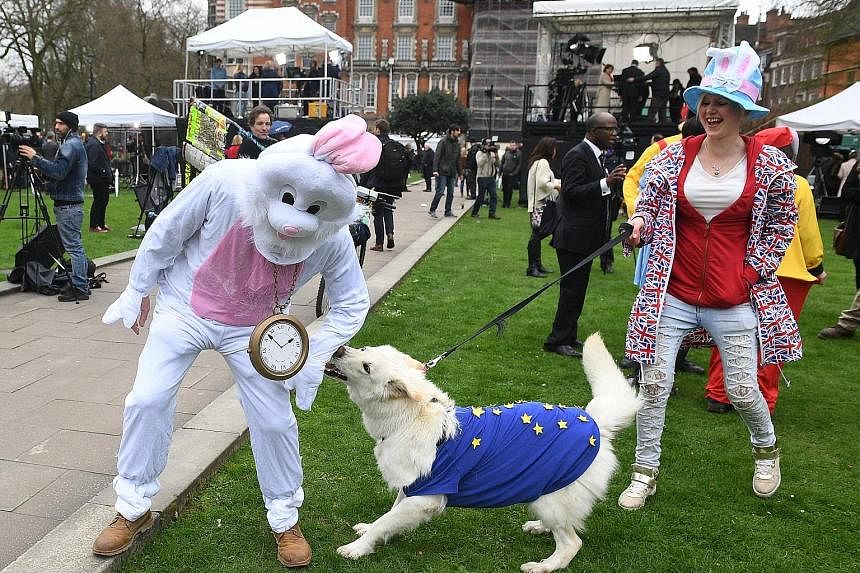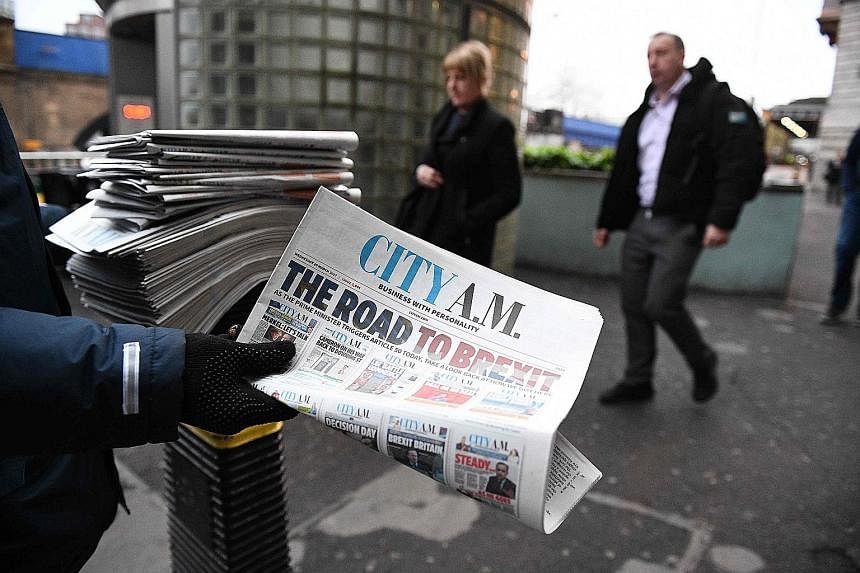LONDON • Britain sought to downplay a row over future security ties with the EU as London and Brussels drew up the first battle lines at the start of their two-year divorce.
France and Germany also put up a common front yesterday against Prime Minister Theresa May's call to negotiate the exit and the new relationship at the same time, setting up a major stumbling block before negotiations even begin.
But a day after Mrs May formally notified the European Union of Britain's intention to leave, it was her warning that failure to clinch a deal on trade would weaken the fight against terrorism that rankled.
"It's not a threat," Brexit Minister David Davis told BBC radio after warnings from Brussels against using security as a bargaining chip in the talks.
He said the "simple truth" was that without a "parallel deal" with the EU, Britain would no longer be a member of the Europol crime-fighting agency or take part in the European Arrest Warrant system.
Mr Guy Verhofstadt, the European Parliament's chief Brexit negotiator, hit back saying "citizens' security was far too serious a subject" to be held hostage to negotiations.
The row came as some of the EU's top leaders fleshed out their strategy for the hard talks ahead as the bloc reels from the blow of one of its biggest members becoming the first state to start withdrawal from the 60-year-old union.
In Berlin, German Chancellor Angela Merkel insisted: "The negotiations must first clarify how we will disentangle our interlinked relationship.
"Only when this question is dealt with can we - hopefully soon after - begin talking about our future relationship."
French President Francois Hollande likewise snubbed Mrs May's proposed structure for the negotiations, saying the exit agreement should come first.
"First, we must begin discussions on the modalities of the withdrawal, especially on the rights of citizens and obligations arising from the commitments the United Kingdom has made," he said.
The fate of three million EU citizens living in Britain and one million British people within the bloc's nations is at the top of leaders' agenda.
Also looming large is the so-called "exit bill" the UK will have to pay, estimated to be as much as €60 billion (S$90 billion).
With the UK dismissive of the suggestion that it must pay that amount, the European Parliament said in a draft resolution that the UK must "honour all its legal, financial and budgetary obligations".
In the first business fallout since Mrs May's Brexit notification, the prestigious Lloyd's of London insurance market said it would open a new Brussels subsidiary to ensure smooth operations in the EU.
Several banks have announced plans to increase operations in continental Europe as a safeguard once Britain leaves the single market.
Before the talks can even get under way, the government outlined plans for the daunting task of bringing some 19,000 items of EU regulation into British law on the day that Britain leaves the EU.
Mr Davis told Parliament that the Great Repeal Bill, which would also scrap Britain's EU membership enshrined in the 1972 European Communities Act, was necessary for a "smooth and orderly exit".
A first response from the EU to Britain handing in its notice will come from European Council president Donald Tusk today when he issues draft "negotiating guidelines" to the EU's remaining 27 member states.
Mr Tusk told reporters on Wednesday that Britain's formal exit notification made it an unhappy day for London and Brussels and that difficult talks would simply be about limiting damage for both sides.
He waved papers as he began a short statement.
"There is no reason to pretend today is a happy day, neither in Brussels nor in London.
"After all, most Europeans, including almost half the British voters, wished that we would stay together not drift apart," he noted.
Mr Tusk's job is to flesh out the EU's strategy by drafting guidelines for EU's chief Brexit negotiator Michel Barnier to be vetted by EU leaders on April 29.
AGENCE FRANCE-PRESSE, BLOOMBERG



